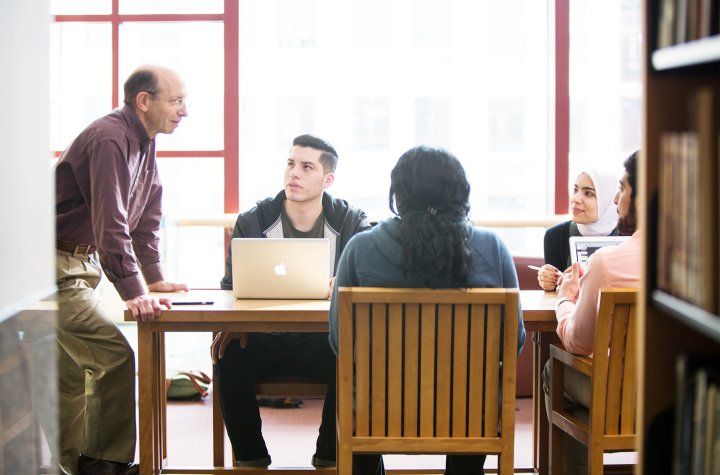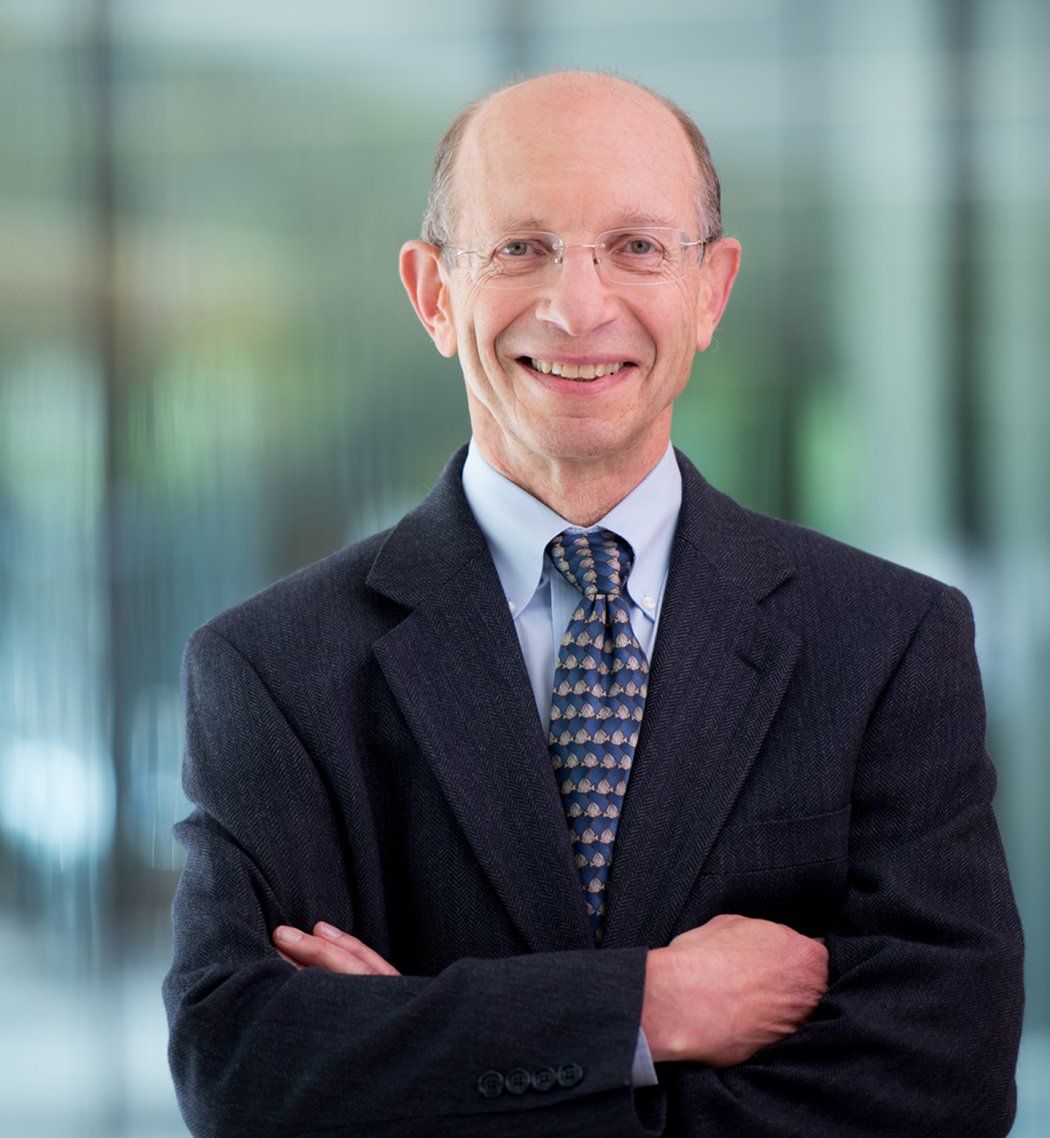Dan Lowenstein, MD, who helped reimagine the century-old Parnassus Heights campus, redesigned key elements of the research infrastructure, advocated for diversity and social justice, and helped develop a new approach to campus safety and wellness, will step down as executive vice chancellor and provost at the end of this year.
His legacy is going to be enormous. He came into the job with deep respect across the campus, and he’ll leave with even deeper respect.”
UCSF Chancellor Sam Hawgood
A beloved teacher, neurologist, and expert on the genetics of epilepsy, Lowenstein will remain on campus to teach and conduct research.
“His legacy is going to be enormous. He came into the job with deep respect across the campus, and he’ll leave with even deeper respect,” said UCSF Chancellor Sam Hawgood, MBBS, who appointed Lowenstein as provost in 2015.
“I’ve learned a tremendous amount about what true servant leadership looks like from Dan,” Hawgood continued. “His empathy for folks across the board – whether it’s an entry-level staff member, a student who’s struggling, or faculty members trying to find their way – Dan always approaches those issues by asking, ‘How can we help? What can we do to lift this person up?’”
An Unlikely Administrator
Lowenstein said he never aspired to be an administrator, but finally agreed at the Chancellor’s urging out of his “passion for adventure and a love for UCSF.”
“Right away, I was so glad I took the job. It’s been a wonderful journey working closely with the Chancellor and the rest of the UCSF community to help each accomplish our goals,” he said. “My thoughts always come back to this core aspect of what we do as a community: Our entire focus is to lessen the suffering in the world.”
During his tenure as provost, Lowenstein taught in the medical school and conducted research, staying close to the heartbeat of the campus. He also retained his commitment to social justice as a creative leader, negotiator and communicator, featuring thoughtful articles on the most challenging issues of our time in his popular e-newsletter, Expresso.
A Legacy of Accomplishment
The most visible and perhaps the most lasting part of Lowenstein’s four-decade legacy at UCSF will be his work as a leader developing the Comprehensive Parnassus Heights Plan, a 30-year blueprint for UCSF’s aging campus.
Within months of becoming provost, Lowenstein started hearing from Parnassus Heights-based faculty who were despondent about the conditions of their labs and were wondering if they could sustain their research programs at UCSF.
“There were clear concerns from the research community that the infrastructure was falling apart,” Lowenstein recalled. “I really tried to bring the voice of our research community into the room when it came to rethinking the Parnassus campus.”
The planning to revitalize UCSF oldest campus took six years. The first phase will begin with a new research and administration building, expected to open in 2026, and the new hospital, planned for 2030. Ultimately, it will result in an engaging design that features expanded open space and landscaping that invites people onto the campus and offers inspiring vistas to the ocean and Golden Gate Park.
Journey to Medicine
Lowenstein arrived at UCSF in 1983 as a resident physician, spending nearly his entire career here except for a brief stint from 2000 to 2003 as dean for medical education at Harvard Medical School, where he earned his medical degree.

But he almost didn’t become a doctor. A bad experience at age 13 with a broken leg and a callous physician made him cynical about the field.
Lowenstein loved science, but he ignored the teachers who talked to him about medicine. Instead, he studied mathematics at the University of Colorado Boulder and pursued his love of skiing and the wilderness. Later, he earned a master’s degree in environmental studies at Pennsylvania State University.
Yet, something always seemed to pull him toward medicine.
After college, he took an emergency medical training (EMT) course to prepare for a long mountaineering expedition with friends in Central and South America. He was amazed by the description of how the lungs breathed, and he fell in love with the mystery of the human body. When the three-month climb ended, he decided to volunteer at a hospital in Bolivia, finally applying to medical school.
Researching Epilepsy
After his internship, Lowenstein did a neurology residency at UCSF and then a fellowship in the lab of Stanley Prusiner, MD, who was conducting the work that would lead to his Nobel Prize for the discovery of prions.
By the time he got to Prusiner’s lab, Lowenstein knew he wanted to specialize in epilepsy. Prusiner told him the best way to have an impact on the field was to pursue the new fields of molecular biology and genetics, advice he is following to this day.
A disease that has been terribly misunderstood and stigmatized throughout the ages, epilepsy held great appeal to Lowenstein, both as a scientist and a human being.
“There’s something about the suffering of patients with epilepsy that reaches deep inside me,” Lowenstein said in an interview with UCSF’s Bob Wachter, MD. “It’s connected to the nervous system, which for reasons I can’t explain, I find fascinating and intriguing, and I love to try and understand.”
The Struggle for Justice
Lowenstein never lost his passion for social justice, dating back to his involvement as a first-year medical student with International Physicians for the Prevention of Nuclear War. He co-chaired the UCSF Chancellor’s Diversity Committee in the 1990s and continues to co-chair the Council on Campus Climate, Culture and Inclusion. He formed the Iraq Action Group in the mid-2000s, and has been honored with the UCSF Dr. Martin Luther King, Jr., Award and the Black Student Health Alliance Faculty Award, among others.
My thoughts always come back to this core aspect of what we do as a community: Our entire focus is to lessen the suffering in the world.”
Dan Lowenstein, MD, Executive Vice Chancellor and Provost
When the racial justice protests swept the country in 2020, Chancellor Hawgood appointed him to lead the UCSF Safety Task Force with Vice Chancellor Renee Navarro, MD, PharmD, to examine how the campus can create a safer and welcoming place for all.
The task force recommended a more holistic approach to public safety that encourages de-escalation and training in implicit bias, and also focuses on wellness and mental health, among other measures.
A Passion for Teaching
Lowenstein was always sustained by a deep and abiding love for teaching. He has won many awards as a teacher and was chosen six times by students to be the School of Medicine graduation speaker. Students also selected him to give the “Last Lecture” in 2013.
“The absolute centerpiece of being an effective teacher is to love your students,” Lowenstein said in the interview with Wachter. “It’s to be able to be with them and be part of their experience and look at each one as a true colleague, as an equal.”
In his Last Lecture, Lowenstein characteristically spoke to everyone in the audience: the students who had selected him, as well as the faculty, staff, and patients who came out of friendship, loyalty, and gratitude.
“There are an infinite number of paths from which to choose, and the challenge is to find the one that is best aligned with your talents, your gifts, your genius, your passions,” he told them. “And it’s my real hope that all of you, both the students and perhaps the not so young people here, will come to realize at some point that your work is not only what you want to do in life, but it’s what you were meant to do in life.”
Chancellor Hawgood is beginning the process to identify the next EVCP and will chair a search committee that will be appointed soon. The job description outlines the scope and qualifications of the role, and the position has been posted for internal and external candidates. Given the breadth of talent within UCSF, the search will be limited to internal UCSF faculty and those with significant prior UCSF faculty experience. UCSF invites applications and inquiries from anyone interested in the role or in further information. For questions or nominations, please contact Meri Scolari, manager of Executive Recruitment in Human Resources.
